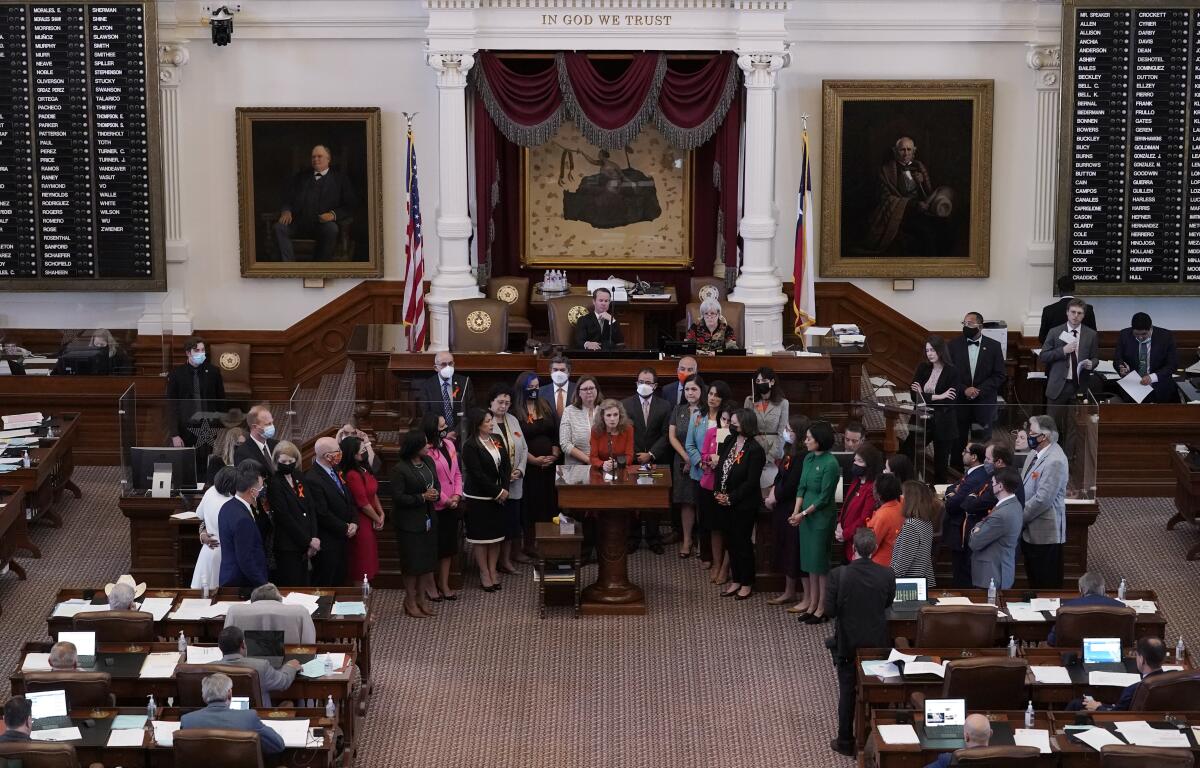Supreme Court by 5-4 vote rules Texas may enforce its six-week abortion ban

- Share via
WASHINGTON — The Supreme Court by a 5-4 vote late Wednesday cleared the way for Texas to enforce a ban on abortions beyond six weeks of pregnancy after denying an appeal from abortion providers.
Citing procedural reasons, the majority said it would not prevent the law from going into effect.
For the record:
4:01 p.m. Sept. 2, 2021An earlier version of this story said the Supreme Court issued its ruling early Thursday. It was issued late Wednesday.
The unusual midnight ruling signals there may be a high court majority ready to overturn the right to abortion set in the Roe vs. Wade decision of 1973.
President Trump’s three appointees — Justices Neil M. Gorsuch, Brett M. Kavanaugh and Amy Coney Barrett — cast key votes to allow the Texas law to take effect.
Meanwhile, Chief Justice John G. Roberts Jr. joined with the three liberals in dissent. He said the court should have kept the law on hold while judges considered its constitutionality. He called the Texas law “not only unusual, but unprecedented. The legislature has imposed a prohibition on abortions after roughly six weeks, and then essentially delegated enforcement of that prohibition to the populace at large. The desired consequence appears to be to insulate the State from responsibility for implementing and enforcing the regulatory regime.”
The Texas Heartbeat Act says doctors may not perform an abortion after the sixth week of a pregnancy, and it authorizes private lawsuits against those who do so.
Justice Sonia Sotomayor called the court’s unsigned order “stunning,” and added: “Presented with an application to enjoin a flagrantly unconstitutional law engineered to prohibit women from exercising their constitutional rights and evade judicial scrutiny, a majority of justices have opted to bury their heads in the sand.” She said the court had “silently acquiesced in a state’s enactment of a law that flouts nearly 50 years of federal precedents.”
The ruling means abortion providers may have to wait until they are sued to challenge the constitutionality of the measure in court.
The court’s majority said nothing about how those challenges will be resolved.
It is the first time since 1973 that a state law banning most abortions has become law.
The Texas law that limits the availability of abortions after six weeks of pregnancy — in apparent defiance of Roe vs. Wade — took effect early Wednesday after the Supreme Court did not act on a pending appeal.
The so-called Texas Heartbeat Act makes it illegal for doctors to perform an abortion after about the sixth week of a woman’s pregnancy. Under the Roe decision and subsequent rulings, abortions have been considered protected until the 23rd or 24th week of pregnancy.
The law also authorizes any person — including those with no relation to the doctor or the woman — to sue a physician and others for violating the measure and collect a $10,000 fine.
Abortion providers said they may be forced to shut down or face a wave of costly lawsuits.
President Biden in a statement condemned what he called “this extreme Texas law that blatantly violates the constitutional right established under Roe vs. Wade.... And outrageously, it deputizes private citizens to bring lawsuits against anyone who they believe has helped another person get an abortion, which might even include family members, healthcare workers, front desk staff at a healthcare clinic or strangers with no connection to the individual.”
Abortion opponents called the day a turning point for the movement in America.
Jeanne Mancini, president of March for Life, said the Texas law “highlights the humanity of children in the womb who have a detectable heartbeat by six weeks of development. States have the right to act on what science and ethics clearly tell us, which is that these children have their whole life ahead of them and deserve our protection.”
Employees at Texas abortion clinics, where California doctors sometimes fly in to help staff, were scrambling to explain the new law to patients.
“We’re getting patients who are scared, confused, angry. They’re asking questions about, ‘Is abortion still legal?’ ‘Can I still get an abortion, am I too far along?’” said Vanessa Rodriguez, contact center senior manager for Planned Parenthood of Texas. “I have to tell them Texas politicians are taking away their right to make decisions they feel are right.”
Lawyers for Planned Parenthood and other abortion providers filed an emergency appeal Monday asking the Supreme Court to put the new law on hold so that a judge in Texas could rule on their legal challenges.
Providers fighting the law have told the courts it would eliminate 85% of abortions statewide, force clinics to close and compel women to travel hundreds of miles out of state for abortions — or try to self-induce a miscarriage.
Last week, the U.S. 5th Circuit Court of Appeals issued an order depriving a judge in Austin, Texas, of the authority to rule on the measure or block it from taking effect.
.
Abortion rights advocates said the Texas law clearly violates the Roe vs. Wade decision, which overturned a Texas abortion ban in 1973 and said women had the right to end a pregnancy.
The court is already due to reexamine its abortion precedents in a Mississippi case scheduled to be heard in late fall. The new Texas law jumped ahead of the high court’s plans.
Whit Ayres, a GOP pollster based outside Washington, said the Texas ban’s passage “will be enormously encouraging for the right-to-life forces,” but cautioned it will not settle the issue.
“The moral dilemma involved in abortion is not going to go away,” he said. “The fact that different states have dramatically different values will continue to fuel these debates with outcomes that are dramatically different in places like Massachusetts and Texas.”
The Texas law posed a procedural complication for abortion rights advocates. Unlike most state antiabortion measures, it is not enforced by government officials, but instead “exclusively” through civil lawsuits filed by private parties. That raised the question of whether doctors and abortion providers would be able to challenge the law before they have been sued.
Usually when facing a new law that appears to be unconstitutional, lawyers file a lawsuit against the state’s chief law enforcement officer and ask a federal judge to block the measure from taking effect.
But in this instance, it was unclear who could be sued as a representative of the state.
On Monday, abortion rights advocates filed an appeal with Justice Samuel A. Alito Jr., who hears such emergency appeals for the region, and urged the Supreme Court to intervene to prevent states and judges from ignoring its past rulings.
They said the Texas case “presents the question whether a state can evade federal court review of a state law that is in clear contravention of this court’s precedents by creating a scheme of private enforcement in the state’s courts,” lawyers for Planned Parenthood told the justices.
Marc Hearron, an attorney for the Center for Reproductive Rights, said the law “creates a vigilante scheme” that will encourage many people to file lawsuits against abortion providers as well as those who “aid or abet” them. They are entitled to $10,000 in damages and have their court costs paid by the abortion provider if they win. However, they pay no court costs if they lose, he noted.
“You could have hundreds of cases filed across the state over one abortion,” he said in a phone interview. “Everyone should be extremely concerned about this law, on all sides of the abortion issue,” he said. “If the state can outsource its enforcement authority against people for exercising their fundamental rights, it would allow any state to attack any individual right.”
For example, this fall the court will consider whether to strike down gun restrictions in New York and California that deny permits to many residents who would like to carry a concealed weapon. But if Texas can authorize private lawsuits against doctors who perform abortions that are protected by the Constitution, then New York and California could consider authorizing lawsuits against gun owners who carry a weapon in public, even if they are protected by the 2nd Amendment.
Under the law, Texas Senate Bill 8, “a physician may not knowingly perform or induce an abortion on a pregnant woman” if a fetal heartbeat has been detected or if the physician fails to perform the required tests to detect a heartbeat.
The law “shall be enforced exclusively through private civil actions,” it said. Moreover, “any person” may sue in state court anyone who performs an illegal abortion as defined by the law or “aids or abets” such conduct, and a successful plaintiff is entitled to $10,000 or more in damages.
Employees at Whole Woman’s Health, which operates four Texas clinics and had sued to stop the ban, rushed overnight to provide abortions to dozens of waiting patients before the law took effect Wednesday, said Amy Hagstrom Miller, president of the group.
“Our waiting rooms were filled in all of our clinics,” Hagstrom Miller said.
Outside their Fort Worth clinic, antiabortion protesters shined lights through the windows and called police twice to ensure the law was enforced, she said.
Texas had already enacted some of the nation’s toughest abortion restrictions in recent years. Those measures were later overturned by the courts but still took a toll on abortion providers who fought them.
Last year, Gov. Greg Abbott managed to close abortion clinics by declaring abortion among elective procedures suspended because of the COVID-19 pandemic. And in 2013, more than half of the state’s 40-plus clinics closed before the U.S. Supreme Court struck down a state abortion law.
Democratic groups predicted the law, and the Supreme Court’s response, would become a factor in next year’s midterm election.
“This attack on women’s healthcare is a powerful reminder of the stakes in next year’s election — and why we must defend a Democratic Senate majority with the power to confirm or reject Supreme Court justices,” Democratic Senatorial Campaign Committee spokeswoman Jazmin Vargas said in a statement Wednesday. “The freedom for women to make our own health care decisions is on the ballot in 2022.”
Georgia Democratic Sen. Raphael Warnock, a top GOP target, tweeted, “The extreme abortion law in Texas is exactly why we need to keep a Senate with the power to appoint Supreme Court justices that respect a woman’s right to choose.”
More to Read
Get the L.A. Times Politics newsletter
Deeply reported insights into legislation, politics and policy from Sacramento, Washington and beyond. In your inbox three times per week.
You may occasionally receive promotional content from the Los Angeles Times.












